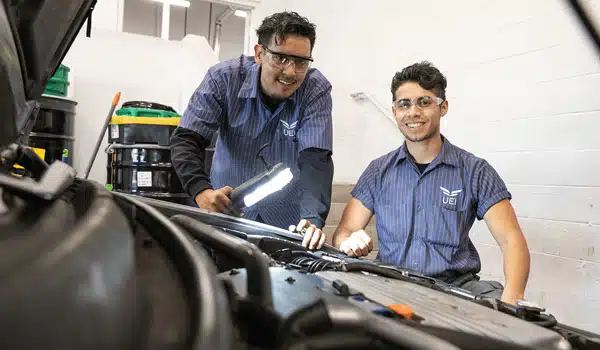What is an Automotive Technician & How to Become One
| Update: September 05, 2024
With millions of cars on the road today, there’s a great need for experts to help keep them running and functioning safely. With training to become an Automotive Technician, you can gain valuable skills that will help you diagnose, maintain and repair automobiles. In less than a year, you could begin a career that allows you to work with your hands, solve problems, and help others get back on the road quickly. Read on to see if this career is a good option for you.
If you find that becoming an automotive technician is right for you, consider enrolling in UEI College's Automotive Technician Program. The program is short-term, meaning you'll be able to earn your automotive technician diploma in as little as 10 months, placing you on track to begin a career in the automotive field fairly quickly. So, if you want to know how to become a mechanic, read below to find out what you need to do!
What is an Automotive Technician?
An Auto Technician inspects, diagnoses, and repairs cars, trucks, SUVs, or any other type of vehicle. They may work in a repair shop, the service department of a car dealership, or a mechanic shop performing essential maintenance or repairs.
Auto Technicians are trained to use tools and equipment to detect issues within a vehicle’s electrical and computer components. They can interpret error codes which allows them to discover underlying problems and discuss solutions with customers to get their car in working condition. Auto technicians provide a valuable service to anyone who owns or drives a car, ensuring they are safe and can get where they need to go.
What Does an Automotive Technician do?
The roles and responsibilities of an Automotive Technician may vary from shop to shop, and additional experience can lead to new opportunities. A smaller repair shop may be doing repairs on all types of vehicles and systems, while a larger shop may specialize in one area, like lubrication, front-end maintenance, brakes, or air conditioning.
Technicians provide the best customer service possible by testing vehicle functions, tracking routine maintenance needs based on mileage, pricing all options out, and presenting these options to customers to ensure their vehicle runs well for years to come.
What Are the Duties of Automotive Technicians?
The duties of an Automotive Technician may include:
- Test driving vehicles and inspecting parts and systems to ensure proper function
- Using computerized diagnostic equipment to interpret vehicle diagnostic codes and mechanical problems
- Performing routine maintenance like oil changes, tune-ups, brake checks, fluid checks and changes, tire alignments, tire replacements, and tire rotations
- Ensuring accurate maintenance based on mileage and checklists
- Repairing and replacing brake pads and wheel bearings
- Explaining issues, possible solutions, repair plans, and price quotes to customers
- Disassembling parts, adding lubricant, and putting things together again to ensure the best function
Auto Technicians with experience and special certifications may handle more complex issues.
What Careers Does the Automotive Technician Program Prepare You For?
UEI College’s Automotive Technician Program will give you the skills and knowledge you need to work in a repair shop, dealership service center, or any mechanic shop as an:
- Auto Technician
- Preventative Maintenance Technician
- Automotive Service Technician
- Mechanic
- Installation Technician
- Dealer Auto Service Technician.
Where Do Automotive Technician Graduates Work?
Automotive Technician graduates may find entry-level positions in small independent repair shops, body shops, or in larger car dealership service centers. They may also be able to find work in shops that focus on one specialty, like oil changes or tire services.
With experience and additional certifications, you may be able to rise through the ranks to management positions or even open your own repair shop.
Shops are usually well-lit with a strong focus on safety. Technicians work with parts that may be greasy or dirty and may need to get underneath a vehicle to see its components better. Many repair shops expect employees to work 40 hours a week, but some may offer extended hours in the evenings and weekends and opportunities for overtime.
New graduates are likely to work in a shop with many other technicians in a team environment. You may be working independently but with close supervision from someone with years of experience. Most employers like to see employees who are willing to work safely but quickly, to get clients in and out as soon as possible.
The skills used by Automotive Technicians are also valuable in many other industries. Due to a lack of skilled workers, properly trained technicians may be able to work in other industries that use similar components to automobiles.
Do You Need a College Degree to Become an Automotive Technician?
You do NOT need a college degree to become an Automotive Technician, but you do need a great deal of knowledge about cars and experience handling the tools and equipment used in a shop. The quickest way to receive this training is through a trade school program like UEI College.
Mechanics usually solve automotive problems by looking at automobiles and taking things apart. They are also trained to use technical equipment to interpret diagnostic codes in a car’s electrical system and are also trained to do the work to solve the problem.
As with most jobs, the more training and experience you have, the more opportunities are available. You could go to a two- or four-year program to become an Automotive Technician, but if you are eager to get started and work with your hands right away, a trade college can help you get the foundational knowledge you need to be successful in getting into the field. With a foot in the door, you can learn from others in the field, take certifying exams and find new opportunities. You never know what doors can open when you follow your passion!
How Long is the Automotive Technician Program?
You can complete your training to become an Automotive Technician in as few as 10 months at UEI College. The Auto Mechanic Program at UEI College is hybrid, meaning you complete assignments and attend lectures online but come to campus twice a week for hands-on experience working with real tools, equipment and vehicles. During in-person class time, students will be able to practice every concept, talk during lectures, and handle the components of the vehicle. By the end of the course, you’ll know how to take each piece apart and put it back together again—and it can all happen in less than a year.
What Do You Learn in the Automotive Technician Program?
UEI College’s Automotive Technician Program provides you with hands-on learning experiences to gain a foundational understanding of how to diagnose issues with a vehicle and how to repair and maintain vehicles of all types. The lessons taught will prepare you for an entry-level position in any maintenance or repair shop.
Our courses will teach you about engine, transmission, ignition, fuel, brake, and steering systems. The curriculum covers all types of vehicles, from manual and automatic transmissions to hybrid technology.
Students will learn about:
- Design and development of vehicles
- Accident prevention and shop safety
- Diagnostic equipment
- Vehicle electrical components
- Engine components
- Restraint systems
- Use of hand tools
- Fuel and exhaust systems
- Electric and alternative fuel vehicles
- Tires, wheels, and suspension systems
- Manual and power-assisted steering systems
- Heating and air conditioning systems
- Brake systems
- Repairs and maintenance for brake systems
- Disassembly and reassembly of transmission systems
- Professional communication skills and workflow management
Courses include:
- AT110 Engine Theory and Systems
- AT120 Electrical Theory and Diagnosis
- AT130 Engine Performance and Ignition Systems
- AT140 Fuel Systems and Emission Controls
- AT150 Steering, Suspension, and Passenger Comfort
- AT160 Brake Systems
- AT170 Manual Transmissions
- AT180 Automatic Transmissions
- AT190 Preventative Maintenance and Hybrid Technology
Each course includes both online learning and hands-on experiences working in the automotive shop on campus. You’ll have the opportunity to learn from experienced instructors and practice skills on actual vehicles. The school also offers open lab times on Fridays and tutoring for students who need extra assistance or desire extra practice of their skills.
Should You Become an Automotive Technician?
Skilled Automotive Technicians have the opportunity to work with their hands and provide a valuable service to clients. There are many benefits to becoming an Automotive Technician:
Fast-paced workdays.
Working on your feet, with your hands, and solving problems as quickly as you can, can make the hours fly by during the day. If you’re someone who enjoys seeing quick results, working on cars is a great career. You’ll be able to diagnose issues and find solutions, and that instant gratification can make the day go by in a flash.
Ability to work independently.
While you may be working in a shop surrounded by others, you’re often solving a problem all on your own. With more experience, you may have more options for the type of environment you work in. You may decide to work alone and become a traveling mechanic, going to different homes to work on their cars.
Get started quickly.
Training to become an automotive technician can be completed in as few as 10 months.
Opportunities for advancement.
The automotive industry can be competitive, but once you get your foot in the door, there are many opportunities for advancement. With more certifications, you can take on a specialty or possibly even open your own shop or business.
Interact with new people.
Millions of people own their own cars, but not many know how to fix them if something goes wrong! As an Automotive Technician, you have the opportunity to help people with something they cannot do on their own, and you’ll feel a great deal of satisfaction when you gain repeat customers who trust your skills and knowledge.
As with most jobs, being an Automotive Technician isn’t for everyone. Here are a few things that you may not like about being an Automotive Technician:
Shops can be noisy and dirty.
The power tools used to work on cars can be loud, and a vehicle’s components are often dirty and greasy.
There’s always a safety risk.
You may need to get underneath a vehicle to reach certain components, and working with heavy equipment is always a risk. This is why safety is such an important topic to cover during every module of training.
Work can be very physical.
You may have to bend over and twist into uncomfortable positions to reach certain things. This can be more and more difficult with age.
You may be asked to work long hours.
Most shops will expect you to work just 40 hours a week, but they may open early, close late or work on the weekends to meet the needs of clients. If you are working on a particularly time-consuming repair, you may be asked to work odd hours to get it done.
You’re responsible for your work.
While it’s nice to work independently, this means you have to own up to any mistakes you make. Car trouble is stressful, and clients may be understandably frustrated when the issue isn’t fixed quickly. You need good conflict resolution skills to communicate the issues you run into in a professional manner.
Conclusion
If you are driven, you enjoy working with your hands, and you like helping people and solving problems, becoming an Automotive Technician is a great career option. You can complete training quickly and begin an entry-level position in less than a year. If you enjoy working on cars as a hobby, why not make it a career that you can grow into for years to come?
What Should You Look for in an Auto Technician Program?
If you’re serious about training to become an Automotive Technician, you’ll need quality training that provides you with the tools employers want to see. You want a program that’s flexible, interesting, and worthwhile. You should take your time learning about the training programs in your area.
Hands-on Experience
There are many things to look for in an Auto Technician program, but one of the biggest and most important things is the opportunity for hands-on experiences. You can learn a lot from reading and listening, but the work of an auto technician is very physical. In order to receive the best training to do the job, you should have the opportunity to get your hands on real equipment, real vehicles, and real tools.
Ask to take a tour of the shop, meet the instructors, and take a look at the tools and equipment used in the lab.
One-on-one opportunities
In addition to the equipment, you should look for an Automotive Technician program that offers reasonable class sizes. Having equipment on hand is no good if there are too many students around to be able to touch it. You need to have the opportunity to complete tasks independently in order to feel comfortable doing them later on.
Knowledgeable instructors
It can be difficult getting a foot in the door in the automotive industry, but many programs hire teachers who have experience working in the field and may be able to connect their most dedicated students with local shop owners.
As you look at different schools, look for instructors you feel like you can connect with. It’s always nice to know you’re learning from someone who is knowledgeable and experienced, but it’s even better if they can recommend you in a competitive field.





